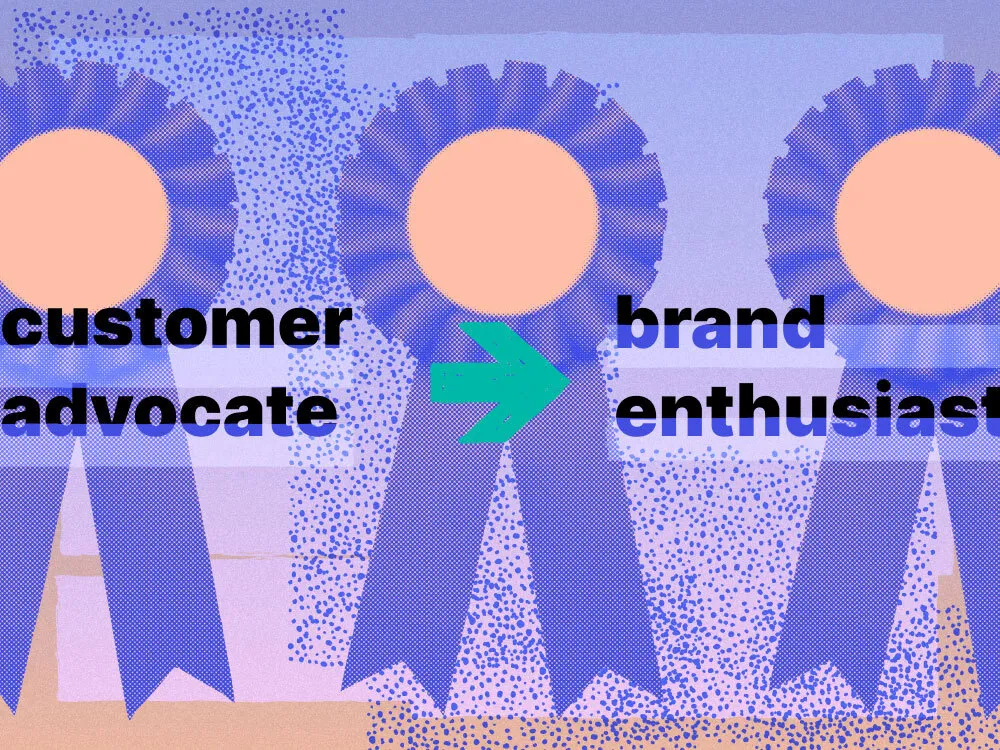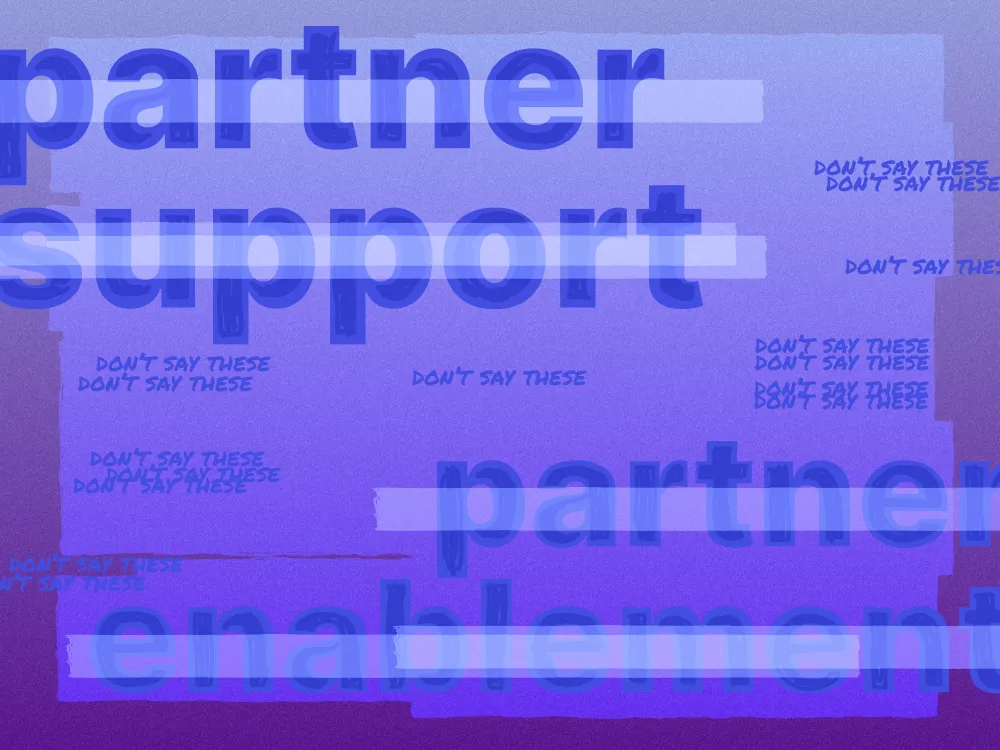We've all been there. You're knee-deep in a business conversation and out tumble those partnership terms – the ones that seem universally accepted, but often leave more room for confusion than clarity. We’re talking about the B2B terms like bandwidth, end-user, low-hanging fruit, and all those bluffs. These well-worn phrases have long been the go-to expressions for collaboration, providing a polite but sometimes vague way to communicate ideas.
Words matter, and language is powerful. Period. The language we use can sometimes hinder rather than facilitate the process of doing good partnership work. If you're nodding in agreement, you're not alone.
It's time for a linguistic refresh. In this article, we're putting a spotlight on B2B terms that are overdue for an update. Plus, we’re offering helpful suggestions to replace them in your partnership glossary stack.
Related: 10 work email phrases to stop using and what to say instead.
Partnership terms to avoid — and what to say instead
Avoid: Synergy
The term "synergy" has become an overused buzzword in business to the business industry. Theoretically, when two entities collaborate, their combined efforts should create something extraordinary, more than the sum of their parts. It sounds great but often needs more specifics and clarity in practice. It's similar to saying, "Let's make magic happen," without revealing how. Yikes.
Using it also has the chance to make your audience feel uncomfortable by discouraging partners from providing feedback. Not just this, but it can also stunt the growth potential of the collaboration. What if the partnership doesn't find them well or align with their goals? It might put people in a tight spot. They might hesitate to express their concerns, as they don't want to be seen as the naysayers who question "synergy”.
Try this instead: Alliance
"Alliance" is more precise and unambiguous that makes partnership communication much more engaging. When you say "alliance," your partner or colleague will instantly understand that you're discussing working together. There’s no room for misinterpretation as you invite clear and purposeful collaboration.
Avoid: Partner initiative
Another term that has been a long staple in business discussions, yet, it often cloaks itself in confusion because it lacks a universally defined meaning.
Imagine sitting in a partnership meeting where "partner initiative" takes the main stage. It sounds promising, but what exactly is the initiative? Is it a new product feature? Or perhaps a joint marketing campaign. All we can see is a blank face with question marks in your head. Without clear and actionable specifics, people would assume different aspects of the partnership.
Try this instead: Go-to-market strategy
Shifting our focus to "go-to-market strategy” ensures everyone is on the same page. It represents a concrete plan for reaching your target audience with your products or services. Simply put, it's the same as handing everyone in the boardroom a well-defined blueprint with your shared objectives.
The language switch here makes collaboration easier and more productive for your sales and marketing teams.
Avoid: Big cloud provider
Tech people unite, because it’s time to put this lacklustre label in the recycle bin of tech jargon. Why, you ask? It's a cliche of tech talk— old, tired, and not adding much to the conversation.
Think about it. When you refer to Amazon Web Services, Google Cloud, or Salesforce as merely "big cloud providers", doesn’t it feel like calling Mona Lisa just a "nice painting"? Technically true, but it's missing all the awe and substance. These companies aren't just big; they're the global tech powerhouses, the mitochondria of the tech world.
Try this instead: Hyperscaler
The term "hyperscaler" adds life to our tech lingo and gives a more nuanced and accurate description.
Hyperscaler precisely captures the wide scale and capabilities of cloud giants. It goes beyond the size, covering the immense computing power, global reach, and services offered by these platforms.
Avoid: Sales timeline
Being precise is crucial for smooth teamwork and setting goals when discussing B2B sales processes. But when you throw around buzzwords like "sales timeline" it's similar to sending your team on a scavenger hunt with no clues. Cue the confusion!
This lack of specifics and ambiguity confuses everyone about the various stages in your sales journey. Worst part? This confusion can spill over to clients and colleagues, too.
So, using vague terms can mess up client meetings and team talks; we suppose you wouldn't want that to happen.
Try this instead: Time to first sale
Cut through the sales jargon and let your sales strategy speak a language everybody understands. The phrase "time to first sale" simply focuses on the nitty gritty of how long it takes to make the initial sale.
For instance, a software company might aim to reduce the time to the first sale for a new product launch or a new feature. Here, we are not simply referring to the vague target. But a tangible goal that rallies the team.
See more: Partner program KPIs you should measure and optimize in 2024.
Avoid: Distribution
And there it is- the dull hum of "distribution" overshadowing everything. Its original usage described moving goods from point A to point B. But we can now hear it from every corner of the corporate office.
Suppose you're pitching your company's growth plan for product X, and all you offer is "distribution". You’ll leave your audience with no idea what, how, or where the distribution will take place. No clear indication will lead to a lack of engagement.
Try this instead: Channel sales
You ask why “channel sales” instead? Well, we have a lot of valid reasons as to why it’s a better alternative. This phrase precisely denotes the use of different channels to reach your target audience, thus enhancing the clarity of your business plan.
When you use this term, marketing, and sales efforts are seamlessly integrated. So, this alignment ensures there's a cohesive strategy. What’s more, it also incorporates sales-qualified leads and marketing-qualified leads for tangible outcomes.
You might also like: The best partner managers do these 15 things.
Avoid: Brand enthusiast
You've probably come across the term "brand enthusiast" more times than you count. It's a go-to label for individuals who passionately support a particular product or company. But now, this generic phrase has lost all its charm, much like the dreaded phrase “influencer”.
Because let's face it. We can do more than slapping the "enthusiast" label on devoted or existing customers. Why not opt for a term that is more people-centric? It's much better to upgrade to a term highlighting the reciprocal bond between a dedicated clientele and business.
Try this instead: Customer advocate
We are all about maintaining authenticity and adding a special touch, whether discussing B2B partnership terms or savoring our freshly brewed morning coffees. The term "customer advocate" reflects a deeper relationship between the brand and the customer. It captures the depth of the customer's genuine commitment.
Calling our awesome brand lovers "customer advocates" who love and support your product is similar to giving them the big title of superheroes. It makes them feel like a partner rather than just the existing customers.
If your customers are not just fans but go the extra mile to support your product, why not acknowledge and celebrate those fantastic folks? It's more than a win-win.

Related: Expert tips to drive customer signups from network pros.
Avoid: Growth
In our everyday talk about getting better at stuff or planning for what's ahead, we've turned the word "growth" into this one-size-fits-all phrase. It’s not that it’s a bad or unhelpful phrase; the problem is that it has become a default term for every goal. Isn’t it similar to saying, “I want something good to happen?” But what?
Thus, it needs to be narrower and more specific. A habitual, go-to word that lost all its punch because of its excessive usage needs a revamp.
Try this instead: Incrementality
A minor tweak in your language can lead to a significant impact. See, "growth" is like a big umbrella term — it sounds good, but doesn't give much information. Opting for "incrementality" over the ubiquitous term is like switching from saying, "I want to get better at football," to "I want to improve my passing accuracy by five per cent in next month." Notice the difference? It trains us to think of progress as a series of measurable steps, encouraging us to outline how we plan to progress.
Avoid: Partner support
How does offering a generic service without a clear, detailed plan sound? Frankly, a letdown. Can you imagine if a software company tells its clients, "We provide partner support," without specifying whether it relates to strategic, technical, or logistical aspects? Without further details, the recipient may wonder what support is available and how it aligns with their needs. It doesn't communicate the active involvement required for a strong collaboration.
Try this instead: Partner enablement
Partner enablement is a better choice as it communicates the idea of helping your partner. Using this terminology in business cuts through the noise and holds the value of collaboration. Unlike bland "partner support," it's more than a term screaming, "Let's be hands-on in each other's success."

Avoid: Best practices
You've probably heard "best practices" more times than you count. It also makes Inc.com’s list of most annoying business buzzwords, landing at number 10. Let’s be honest — It's cringe-worthy, and what does it even mean? Is it an ultimate guide to doing things correctly or a go-to phrase for those who want to sound knowledgeable without saying much? It's a generic phrase thrown around when specifics are lacking.
Try this instead: Proven methods
The term “proven methods” sounds much more compelling and less pompous. And who wouldn’t want to follow a strategy grounded in proven success? It cuts through the buzzword clutter and appears more effective.
Avoid: Sales bonus
We're tired of the same old rhythm. The mundane "sales bonus" seems as lively as the snooze button. This term echo a transactional tone, merely offering monetary rewards without the spark of excitement. Unlike handing out those shiny participation trophies, your sales rep would just yawn at the prospect of another bonus program. So you need something spiff-tacular!
Try this instead: Sales spiff
Why not use a term that infuses a sense of excitement and motivates the sales team with a touch of fun? "Sales spiff" here will intrigue your sales strategy, turning routine incentives into a high-energy competitive work environment. Your sales floor is ready for a language makeover where every win would feel like a victory lap.


















